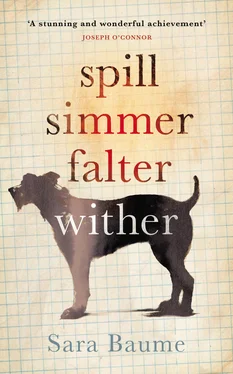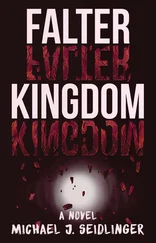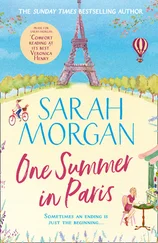My father always left very early in the morning and arrived back travel-weary and infused with the scent of the pineapple air freshener that swung from his rearview mirror, and some nights he didn’t come back at all. When I was a boy, he’d bring me toys and clothes in crumpled carrier bags. The jumpers were usually bobbled with thumb-holes low down in the sleeves, and the jeans were patched in places with slightly brighter squares of denim. The teddy bears were pre-cuddled, the tyres of the dinky cars shorn to their hubcaps, and if anything ever needed batteries, they came either missing or flat. But I didn’t mind. The toys didn’t need to move; I made them move myself. And besides, I liked to imagine the children who played with them before me. I pictured their faces, made up their voices. Then I shifted my playmates into place around me. I included them in my games.
Oftentimes the carrier bag would be box-shaped and jagged. These were the ones I liked the best, they were filled with books. The pages were already dog-eared and finger-printed, sometimes there were even crumbs. But I didn’t mind. I thought then that nothing could ever be absolutely new. The world was so big and so full of people I was certain that every material thing must be used and reused to its zenith; this was the only way it could make sense.

Now I’m afraid to go take you out during the daytime. Now I’m afraid to go out alone.
‘Quiet now,’ I tell you, ‘quiet.’
You’re at the window, yapping. You yap with your whole body, as if each yap were a volt of electricity, cracking through you from whiskers to tail. Now the schools have closed for the summer holidays. I can tell from the arrival of the boys who congregate along the sea front in the evenings, who frolic around until after dark. They’re no smaller than twelve, no larger than sixteen. They number four at least and ten at most, but it changes. Maybe they’re the same boys as last year or maybe they’re the baby brothers of last year’s boys, I can’t tell. They all have the hoods of their tracksuit tops raised and the laces of their runners left undone. They all have the same shiftless way of holding themselves, as though their limbs are hinged into their torsos by a network of sagged bungee clips. Always, they’re an unsightly bunch, see how the silhouettes of their oversized adolescent heads block the bay out? From now until autumn, they’ll be there every warmish night irrespective of the pizzle, as if they’re immune to poor weather, as if the blaze of their hormones is keeping them consistently toasty inside. Their presence is the price paid for longer evenings, a reminder that lessened cold and added light is public property, and not ours alone, as I would like.
The summer boys come from housing estates built into the fields and hillsides stretching inland away from the village and the sea. The housing estate houses are as young as the boys and just as indistinguishable from one another. Venetian blinds and block-paved driveways, dormer windows and red-brick cladding. See that woman coming out of the takeaway? She’s the mother of a summer boy. I can tell from the way she has the face of a potato and the hair of a film star. See that man coming out of the pub? He’s the father of a summer boy, a neatly dressed but beleaguered version of his son, coat over tracksuit and laces neatly tied. These are the people who buy the tool belts and steam mops and magic knickers we see advertised between television programmes, and every day at dusk, their sons trail down-slope to the shore wall. They swagger and perch. Snigger and sigh out a language of abbreviated words and exaggerated gestures drawn from experiences exclusive to this itchy, nasty phase of their lives.
They wait until the grocer’s shutters are lowered and most of the curtains along the main street have been drawn. Now they produce cartons of cheap Czech lager and cigarettes stolen from the jacket pockets of their dads. The lit street lamps are casting a spooky pallor to the boy’s expressions, a hint of menace to suit their moonlit raillery. Sometimes there’s a football and I hear it very late and from my bed, pounding against the salon’s shutters like a leviathan crawled from the sea, knocking to be let in. And in the morning I’ll see scuffs on the sides of the car, perfect circles in the dust where the leather was kicked, struck. The suction cup prints of a colossal tentacle fastened and unfastened in a moment.
Come away from the glass. It’s the most dangerous thing in the world to draw attention to my father’s house. You don’t understand what those boys could do, how easy it is for them to destroy me, to destroy us. I’ve always regretted the way the living room window faces square onto their summer territory and can be faced square back into. This is why I always pull the curtains when it’s full bright, why we never get to watch the sun set behind the buildings across the harbour. I’m afraid the boys will look up and see me sitting pathetically in front of the television with my pathetic dinner on a plate on a cushion nestled between my pathetic knees. I know how cruel boys can be. Even the one with calipers, when we were both older, joined his friends to chase me, chanting, down the laneway, and I saw that what he really kept inside his pencil case were stones for chucking at my window. Now I’m afraid these new boys will come to know me. I’m afraid they’ll call out when they see me on the street. I’m afraid they’ll form a procession as I gambol to the shops and back. Can you picture it? All the summer boys pitching and flailing and clumping in unison behind me.
‘Come away from the window,’ I tell you, ‘away.’

The temperatures are rising, a little bit, I think. The toadflax swells and stretches. From the walls of the village, valerian pushes through the brick’s seams and points unsteadily upward, toward the rooftops. See the buttercups and birdsfoot trefoil. See the red clover which is not red, but pink, pink as the valerian. Now is the season of yellow and pink. The days are still grey, but the grey is lukewarm and airtight, like the village and the bay are sealed inside an enormous Tupperware tub.
You sit quietly on the windowsill. In the potbellied armchair, I read. Sometimes you’re up straight and looking away across the water, your thousand-mile stare. Sometimes you lie with your beard rested on your front paws, looking in, watching me. What are you thinking? I wish I could teach you how to read. I wish you could understand when I read to you.

When I was a boy, before my father brought me books, on my bedroom wall he hung a chart with the alphabet on it. Twenty-six squares with a letter and a picture in every one and sometimes with the picture over-spilling its designated square to intrude on its neighbour. The RAT was rudely flicking his tail in the face of the SNAKE, who was in turn shaking his rattle into the topmost leaves of the TREE. The only thing my father told me about the alphabet was that H was aitch and not haitch , Z was zed and not zee . He corrected mistakes I hadn’t even made yet.
It was the old neighbour whose name I can’t remember who, after she’d taught me to sew, taught me to read. I remember she lived above the grocer’s and I called her Aunt even though she wasn’t; she was just the woman my father enlisted to sit with me during the day. At the beginning, I read with the index finger of my right hand tracing each sentence word by word, and each word syllable by syllable. Aunt would sit in the rocking chair with her nose poked over my shoulder and shout the whole word every time I hit an unfamiliar sequence of syllables. Aunt’s eyes were sharp but her hearing was patchy and her limbs were quaky as a rabbit with myxomatosis. She only knew when I’d faltered because she’d see my index finger had stalled and was tremulously hovering. Then she’d shout it so loud that the ladies downstairs in the boutique could surely hear. ‘ENORMOUS!’ she’d shout, ‘TURNIP!’
Читать дальше













